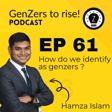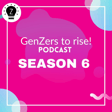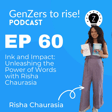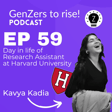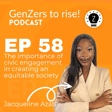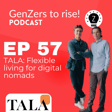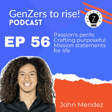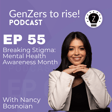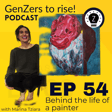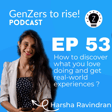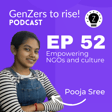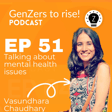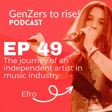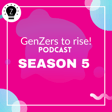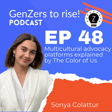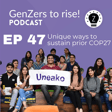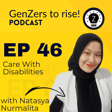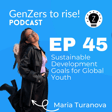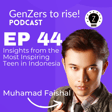Become a Creator today!Start creating today - Share your story with the world!
Start for free
00:00:00
00:00:01

Global Impact: Jénine Shepherd on Youths For Excellence (YFE)
With us on this episode is Jénine Shepherd. Jénine is the founder of YFE (Youths For Excellence). She spreads awareness around the world and motivates people to keep calm and manage their stress. I met with Jénine back in a Thred Media town hall and since that moment I knew that I wanted to interview her.
Here are some insights of this episode:
- What is it like managing an organization in 8 different countries ?
- What motivated you to get started ? What’s the story behind it ?
- What is the mission of YFE ? should i read this ?
- Which are some of your accomplishments ?
- • How do you find collaborators and government officials that support your mission ?
- Your slogan is « Changing nations by empowering generations! ». How do you achieve that ?
- How do you manage stress in your everyday life ?
- Is there any way to get involved ?
- Do you plan to get involved with politics any time in the future ? If yes, what actions would you take to empower your organisation’s mission ?
- Where do you see yourself in the next 5 years ?
Connect with Jénine at https://lnkfi.re/jenine-shepherd
Follow GenZers to rise! https://go.changemakerz.org/follow
Visit the episode's page at https://podcast.changemakerz.org/jenine-shepherd
Access exclusive content on the ChangemakerZ app at https://app.changemakerz.org
Transcript
Introduction to Changemaker-Z and Guest
00:00:01
Speaker
Hello everyone, I'm Kennedy. And I'm Vasilis. We run Changemaker-Z, a student-run initiative that aims to empower, educate, and connect Gen Zers interested in entrepreneurship. We interview teenagers with impactful projects and create resources to help you change the world. If they can't do it, so can you. On this podcast, we discuss the logistics of creating different types of projects with Jin Ziers who have already done it. We will leave our social media and website information in the description.
Janine Sepord's Global Stress Management Focus
00:00:50
Speaker
Hey everyone, welcome to today's episode. With me for the very first time is Salome. Hi. With us today is Janine Sepord. Janine is the founder of YFE. She spreads awareness around the world and motivates people to keep calm and manage their stress. Please welcome Janine. Thank you so much for having me. They're so sweet. It's our pleasure to have you on the show.
Challenges of Managing a Global Organization
00:01:15
Speaker
So in order to begin with, what is it like managing an organization in eight different countries? That's a lot of work, isn't it? Yeah, um that's definitely an understatement. I'll tell you what it's not like. It's not easy. But you know, in all things, I exude gratitude because I do know that even the stress that I have, maybe some people would be grateful to have that stress too. I will say that it is very stressful but it forces you to have a lot of growth.
00:01:51
Speaker
especially as a young person, you have to learn a lot about you know time management as the first thing, but then also managing teams and teams of persons in very different ages. So I know that the youngest person on our team is like 18,
Leadership and Age Diversity
00:02:08
Speaker
right? But then some of the older people on our team can be up to like 60. So it's managing like a wide gap because then not only am I managing the day-to-day and the executive body, but then I'm also managing a board of directors and advisory board. And these are people who have decades of experience in their respective fields, titans of industry, people who are extremely established, like talking Bloomberg, all these different things. so
00:02:34
Speaker
They know what they're doing, so it's like managing across that generational gap as well. yes That's something that's not often talked about with young people, because I'm sure that when you're in certain spaces, you kind of get looked down upon, right? It's like even if you have the same amount of experience as someone who started older than you, just because they see your youth, they think that you're someone that they could take advantage of and walk all over. So that's something that as young people, we have to be very cognizant of. and plan around how to manage
The Importance of Supportive Mentors
00:03:06
Speaker
that. And, you know, I was guess I share my first piece of advice in the first segment. um Something I'll tell people to do, especially when you're working with older people, do not chase, you know, a board or a mentor or somebody who just isn't into you. Work with people who actually want to work with you
00:03:28
Speaker
Because the worst thing you can do is to bring people into your project just because, oh, they're so and so in society or they're established a certain way. But if they're not jigging for you, why do you have them there? The worst thing you can have is someone on your own team who's demotivating you every day. So that's the advice I would give even in terms of bridging that generational gap. You want adults around you who actually want to help you. I totally agree with you. like We need to be very careful when you know we have a huge gap between generations and one of those people working on the same you know team, on the same place, like probably a younger person could say something that an older person would feel that it's not as respectful and the other way. the other way So we have to be very careful setting the limits
00:04:23
Speaker
I understand that your role as a director, and it's not an easy task. It's it's very interesting what you said. i think it's like you raised a I mean, you're definitely into this and you've been in it for a while, so I guess you know what you're talking about, but you're raising points.
Leadership Insights and Organizational Restructuring
00:04:40
Speaker
that if you don't hear them you probably don't realize it but saying stuff like don't chase people that are not interested in what you're doing truly that's that's such a good advice and you probably don't think about it if you don't hear it so that's really interesting to hear. I'll tell you something else too. um When you are as a young person when you're trying to build your organization this is just something that I've learned about leadership
00:05:04
Speaker
because I actually did restructure my company back in 2020, got a new board of directors and everything. As I speak about getting adults who jigged for you and are in your corner and actually do want to help you thrive because even though the name of the show is about to see people, um you know, we are not the ones who often have the power or the money. And that's just simply a fact because we haven't had the time to accumulate, right? um You know, we'll take time to build. And so, as i'm saying this about you know putting together your corporate structure if you want to start a company or um corporate structure as well if you run an NGO and you want to have a board of directors something to be
00:05:49
Speaker
very cognizant of. um As I mentioned you know don't just go for people who are high up in society which can help if you want to have certain doors open for your projects and you want to get certain eyes on your projects but you also need people who actually want to work because the last thing you need is a top-heavy board of directors and then you have the names but it's just you doing everything. Everything. literally everything right which is very stressful because then you're running a huge company you have a team that's reporting to you and then you have a board to report to and like you're doing everything on your own like you're making all the connections on your own so that it's like oh they just look pretty on paper and that's it so that's something else i would tell a young person because i myself have fallen into that trap once I'm not gonna call any names because I'm not trying to get in trouble but that's something that I would tell you guys as young people to be aware of as well that's advice I wish I had gotten from people who were in business before me and again it comes down to the whole youth factor as well um where you try to do something and thenm because of your age as well they don't put as much effort in which is why you try to find people who
00:07:05
Speaker
are actually about helping you. Okay. Yeah. That's, that's
Founding YFE and Education Mission
00:07:10
Speaker
very interesting. But with everything that you said, and I guess you didn't know that like all the kind of the more negative points about managing such an organization, what motivated you into so starting this and what is the story behind it? Or did you get it? Yeah, um so I started up Youth for Excellence um when I was 17. I was in high school at that time. um I was about to take my CAPE exams, which for those who aren't from the Caribbean, that's the Caribbean Advanced Proficiency Examination. It's similar to like British A-levels.
00:07:49
Speaker
um Yeah, so you can get the gist of what that was for. And so I was studying for SATs too at the time. And I decided that I wanted to do something interesting that summer. I went to Campion College and Campion is like the Harvard of Jamaica, if you want to call it that, right? So very prestigious institution. And so basically everyone there is very academically sound. And to show you, I had gotten in there on like a government scholarship because of my grades.
00:08:20
Speaker
So after sixth grade, you basically start high school. High school for us is from grade seven to, I guess, what you guys might call grade 13. But we go first form, second form, third form, fourth form, fifth form, similar to like the British schooling system. And there's two years of sixth form. And this is important because then at the primary level, you have students who will take this exit examination, which determines which high school they go to. And you can imagine that taking a national exit examination, if you come from a background where
00:08:55
Speaker
you know, you're you're suffering from poverty, right? you havet You don't have access to textbooks, you don't have access to healthcare. You not performing well on that exam could simply be a matter of those issues that stem from poverty. But then you underperform and then you end up in a high school with very limited resources and then the cycle just perpetuates, right? So then these students often end up becoming high school dropouts or um They go to a life of crime, they get recruited by gangs. So we can see why intervention at the earlier levels is important.
Holistic Education Pilot in Jamaica
00:09:33
Speaker
And again, my whole thing has been academics. At high school, I would top my year. I would get awards in the island for topping subjects and science competitions and all these different things. So then me and my friends, we were like, hey, we're literally at the top school here. Why don't we try to do some volunteering this summer around things that we know? So education. And initially, it was just supposed to be a thing where we would volunteer for that one summer or something. But as I started to look into it, I was like, ah you know, me being an overthinker, why am I going in and trying to teach these kids things?
00:10:18
Speaker
And you have, say, Vasili or Salome, who have their PhD in education or their master's in education. What value would I, as a 17-year-old, add apart from the fact that maybe I understand the material better because I was just there at one point? That's the most value that I could add. So then I started looking at it, and I was like, but what's the real issue here? and i was like oh dummy poverty you know um so then i started looking i was like wait but what if we could actually give these kids health care because a child struggling to learn in class it might be because they haven't had their eyes checked or they're in serious pain and they haven't had a health checkup or
00:10:59
Speaker
they don't have textbooks or you know they haven't had any food to eat. It's very hard to learn on an empty stomach. So then I was like, yeah, you know what I mean? It just makes sense. so Then I started to create a list of things of resources that we can provide to basically add value to the intervention that we would have been providing. And then I was like, oh crap, this is going to be a lot of money. We need corporate sponsors like yesterday. So that was basically how that happened. And um because we needed corporate sponsors,
00:11:35
Speaker
We had to incorporate because then, you know, it provided tax incentives for companies that donated to us. And then we managed to raise like 2.5 million GMD for like our first project, which roughly equivalent to like um USD 20,000. It was like a small one month project. We did a pilot across three schools with this whole holistic education framework. So we went in, we decided that we were going to teach from like a Monday to a Thursday, um but in itly they would do a diagnostic testing to assess the level that they were at. The level of the students.
00:12:12
Speaker
Yeah, yeah, exactly. So they come in, they do a diagnostic testing, we see where they are. And then based on that, we decide, okay, we're going to group them up with different um tutors that we have. So the ratio at Moles was like one teacher to every three students, which Compared to a class size where it was one teacher for like every 60 students, that was a lot of individualized attention. And so the principals really spoke about that and the support that was there. So this was a test run for us. So then they would come, they'd get breakfast, they'd get lunch from us. um And at the end, they would get food as well to take home. And we would you know give them access to materials and testing materials. And on the Friday um of each week, because we went to three different schools,
00:12:59
Speaker
we would actually give them the health checkups that they did have their eyes checked, comprehensive health checkups, blood pressure, um you know, blood sugar, all of that stuff done. And then we'd also give them school supplies to take home with them because this was done in the summer. So then we were thinking, okay, after our summer school, they could at least bring that back with them for the start of the new academic year. And we tried this out. We did this with a test run of like 600 students that summer um and all of them got free health checkups and everything and the government stepped in. um I'm not sure, JUTC, they're like the public transportation system here.
00:13:38
Speaker
So they actually charted us a bus for the whole month to transport our volunteers like to and from the schools, which is like a lot of money if you can understand. So a lot of people bought into us, even though we were just like 17 at the time. So there is there is power in unity is what I'm trying to say. but That was how it all started, um supposed to be a volunteer thing. And then based on the needs I identified, I realized very quickly from the first project that maybe I should incorporate this because it's just means more sense.
00:14:13
Speaker
I believe that you are one of the very few people that I've met and that have combined so many different NGOs in a single action. You talk about education, healthcare, care people in poverty, and you supported all of these when you're ah you were only 17 years old. and I have to tell them really grateful that your government realized that you were doing something really good and they stepped into the project, they helped you with the resources, however they could at the time. and so like I really have to give you an applause for that. Thank you. so Which are some of your accomplishments, like V1s that you are the most proud of them?
00:15:02
Speaker
Well, I'll definitely say I'm extremely proud of our impact.
YFE's Caribbean Growth and Recognition
00:15:06
Speaker
um We have reached over 12,000 children and their families across the Caribbean region. And for me, I'm also proud of how much we've grown. It started off in Jamaica, where I'm from, but now we're in eight countries. We expanded to like, you know, six other Caribbean islands. And then we incorporated in Delaware back in October, 2021. We have plans to, you know, begin expanding our footprint in the U.S., but for right now, the org is majorly Caribbean focused.
00:15:38
Speaker
So I'm proud of how we've been able to expand our scale. I'm proud of the fact that various different governments have been reaching out to us for our interventions um because they've seen the work that we've done on other islands. So I'm grateful that you know they see us as some form of authority as it relates to youth, as it relates to education. And I am deeply grateful for just about everything where that is concerned. And something that I'm also proud of is the fact that it's not just
00:16:11
Speaker
us who have seen the work that we've done but other entities have lent their support to us and in doing so they've helped to catapult our work. So we received the Prime Minister's Award for Nation Building back in 2018 and then the Diana Award in 2021 and then you know just this year the Anthem Award um for Best Young Person in Education, Arts and Culture and that for me was huge because then I mean you have like you know little people like Michelle Obama and Oprah Winfrey and maybe it maybe Rihanna I think I heard Rihanna at one time like you know just happened to be sharing an award that I happened to be getting it and I was like oh oh so so it's like that okay that's really crazy
00:17:01
Speaker
Yeah, you think about this as a young person and you're just like, Oh, oh crap. Okay. Um, this this is, kinding this is a reality. Look at them here. that' That's really wonderful. That's definitely something you can be proud of. That's really cool. Yeah. like key Yeah. So, I mean, I'm grateful for that. Um, and in all things I'm grateful for life, you know, um, I'm care to be able to make these changes. And for offering life, like you offer a new life to people. That is true. Yeah. And you know, as you say that Vasili,
00:17:37
Speaker
They offered a new life to me. um Something that you don't know about, simply because you know you're not in Jamaica, so you wouldn't have seen the articles about it. But um back in 2018, actually, was when things started kicking off for YFE. And the reason for that was I actually got into a bus crash in 2018.
A Life-Changing Experience
00:18:02
Speaker
June 2018, where I almost died, four people died, and several other people were like hospitalized and comatose. One of my girlfriends had come down from college and she wanted to vacation in Jamaica and I was showing her around the island and we were heading back to the capital city um after a day of horseback riding and showing her around and all these fun things.
00:18:27
Speaker
and this other person who was in the lane next to us was trying to overtake and ended up slamming into our bus and so we ended up crashing into like a mountain face. I mean it was either that or punching into the ocean so I'm glad for the mountain face but there was just so much death and destruction around and that for me actually sent me on like a full-blown identity crisis and I'll tell you the truth. YFE was supposed to just be something that I volunteered at for from time to time but after that accident and having an identity crisis trying to figure out who I was, what do I do with myself now, what purpose do I even have.
00:19:08
Speaker
I decided that I was scared, not of dying, but of almost dying and feel like I didn't really make as much of an impact on the world that like I would have wanted to. Yeah, yeah, exactly. So then I kind of just um threw myself more into this cause because I i needed to feel something I needed to feel a purpose and this kind of gave me that so when you spoke about like they gave me a new life and i yeah I gave them a new life I was like oh you don't even know how much the reverse is true so we were wondering um how did you find collaborators and government officials that support your mission because that that must be like a lot of time that you spend on doing that
00:20:00
Speaker
Oh yeah, it's like pulling teeth.
Building Collaborations Effectively
00:20:02
Speaker
I'll tell you something too, like the whole youth factor as well. You want to avoid tokenism where it's like they collaborate with you like, oh, we care about the youth. Okay. Did you get that? Okay, good. I hate that picture. All right. Okay, cool. out Now we're done with you. Go away. Like, you know, they just see you when it's youth month and then they're gone again. um I will say. that finding collaborators, something that has always worked with me, it starts off with the adults that you have around you once again. Because a lot of the people on my board currently are current and former government ministers, either in Jamaica, even as far over to Ethiopia.
00:20:46
Speaker
right So we have an extensive reach and that again comes from really cultivating your circle of influence as a young person. And the best thing you can do as a young person is not to go around like bragging about your work and accolades, but to actually build something that works and letting that speak for itself. So as a young person, the advice I would give for finding collaborators Think about your project. right Really think through your project. What is it that you're trying to do? What value are you trying to add? What problem are you trying to solve? And what solutions are you coming up with? The solution doesn't have to be unique.
00:21:32
Speaker
right There are many different people doing the same thing. But what is it that you want to do with this? Maybe you can do it better. Like I said, it doesn't have to be unique. Maybe your work ethic and your persistence will actually make it a better thing. But it is presenting that to people who need to see the vision outside of your head. So I think the best thing that a young person can do to get collaborators is to learn how to communicate that vision effectively. And that comes from really thinking through your project, thinking through what it is that you want to accomplish here. Because then if you can have a clear roadmap on paper that Salome can just pick it up or Vasili can just pick it up and see exactly what it is that you're trying to do, that is golden, right? So then when you find that adult in your circle who is very credible, they have this track record. They've built up a reputation over decades.
00:22:31
Speaker
they can see that vision and say, oh, I understand exactly what you're trying to do. I have a friend in this ministry or this government agency or um in this corporation who would really love to support this. Let me make a call. right So it's not like you're coming to them with something half baked, but you're coming to them with something that they can see. I see you have the stats on this. I see you spoke to so-and-so on this. I see you thought about this for like a long period of time. Let me see how I can help you. It's easier to persuade people when they see the work that you've put in and they see the lens that you've gone to to actually create something. So that is the best advice that I can give you. So one, figure out your vision. Two, share that vision effectively with an adult person, like someone who um is respected in the sphere that you're trying to get in. It doesn't even have to be a note. It can also be a young person who is established because I'm a big,
00:23:30
Speaker
a fan of you know finding mentors who are even your age. It doesn't matter. They just have more experience than you do. But finding someone with that experience, that connection that you can then leverage for your project. So after you've explained said vision to them, they're now on the same page as you and you've effectively mobilized them as an agent for your mission, for your cause. So then from there, you can then begin to open doors and get these collaborations. So at least when you write to these ministries, you can copy this person and they can follow up and say, Hey, like I told you so-and-so was going to be reaching out to you about this. um Here's the proposal that they sent.
00:24:09
Speaker
Would you look it over? Would you be open to a meeting? And you know, one thing leads to another. Yeah. Okay. I understand. Yeah. It must be interest important to be able to communicate on your project. So you do have to be clear about it in your head. So if you want people to believe in you, I guess, but I understand, but it must have been a hell of a job to, to put together. Yeah, um the best thing you can learn as a young person are definitely communication skills. So if it's not something that is innate in you, it's a muscle, it can be trained. So I would recommend like finding courses online or just reading.
00:24:53
Speaker
how to express your ideas differently so you're like oh what instead of saying this maybe try saying this instead right and again having friends like you know Vasily or Salome who you're about to send an email be like hey can you read this over for me real quick is this saying what i wanted to say um You don't tell them what you want. to say You say, hey, when you read this, what do you think I'm trying to say? And they say it, and they're just like, okay, good, okay, you got what I was trying to communicate there. And they're just like, but you know, I would actually get it much better if you said this instead. Oh, you know, maybe I should say that too. Okay, great. I get it. Thank you. That's a great point, actually. Your slogan is, changing nations by empowering generations.
Mission and Slogan Origins
00:25:40
Speaker
So how did you came up with that idea? It's really inspiring. I think that it it's really allies to your organization's mission. But like, how did you get up with the idea? It it could be like a quote. oh You know, coming up with that slogan, I... Wow, this was like years ago now. It's difficult to find a slogan, I think. Yeah, it's it's it's it's really, actually. um So we came up with a bunch of different ones. I can't even remember them, but they were so horrible. like god um And then, you know, it really came back to that mission and vision thing that I told you, like having a clear outline of what it was that you're trying to do. That was how we were able to come up with the slogan, because then I went through what it was that, you know, all these things that education would accomplish.
00:26:39
Speaker
If you're giving them the tools to basically lift themselves up out of poverty, because, you know, education is a great tool for upward social mobility. You're essentially empowering them, right? Because then you are working to also cultivate a certain mindset in them. A mindset of, I'm going to give you the tools that you need to succeed. But then you now need to take those tools and build with them. So we're giving you opportunity, but you also have to want the opportunity, right? So it's more so teaching a man how to fish. And yes, you do give him some fish while he learns how to fish and get himself on his feet. But then you, you also have to know that, Hey, like after this amount of time, we're going to expect you to use that fishing rod that we gave you.
00:27:27
Speaker
Right. So that is how the empowering aspect came out. Because I was like, what is all of this doing? And we're like, oh, it empowers them. Right. And then for the them that we're talking about, we're working with students mainly at the elementary school level, primary school level, depending on what you call it in your own countries. But By working with these younger generations, you're building the foundations for societies, for nations. So then you are changing nations by empowering different generations. So then it was just a way of then, now okay, but which what sounds sexy? And then we put it together and it was like, oh, changing nations by empowering generations.
00:28:10
Speaker
Yeah, that's good. It's catchy. It's definitely catchy. You're you're like ridding it and you're like, sounds good. Want to know what what it's about. Yeah. You know, so like, um, again, communication, because then an NGO, just like any other company is a brand, right? You have to have consistent brand messaging. That's something that you also have to learn as a young person because you're not just the founder. You're the marketer, you're the PR agent, you're the accountant, you are the executive director, you are doing like
00:28:47
Speaker
God knows how many other things that you're doing. But you also have to learn to communicate your vision, and effectively which comes back to what I shared with you and like the last answer, you have to communicate really well because then even in terms of getting the support that you need, whether it's media support to push your vision further or getting the support amongst like persons in government agencies, corporations, all these different entities, you do have to think about how your message comes across. Right? So coming up with that catchy slogan, it might sound simple, but it's so important. So important that this is going to stick with your brand for its lifetime. Yeah, I bet that was, that was one of all the tasks you had to accomplish. And like, that's what, that's the image of your thing. So it definitely has to be enough, like catch enough attention. So I think you managed it pretty well. And you as you said, it was a while ago and it's still the same one. So it means it's good.
00:29:45
Speaker
yeah Yeah. We were also wondering um if you have any stress, how do you manage it in your everyday life?
Personal Stress Management Techniques
00:29:55
Speaker
yeah so um God, that's for me personally. um You know, I actually sleep with my Bible under my pillow because it helps a lot with my anxiety and my nerves. um And Psalm 46, for those who are Christians on this podcast, Psalm 46 for me is what helps to ground me, is my favorite Bible passage.
00:30:20
Speaker
um It encourages you to find refuge in God. For those of you who are not religious, um you can definitely lean on your family. My mom is my biggest cheerleader out there. I call her at 4 a.m. and I cry. and She's someone who's just always been there, always will be there, and I i love her to death. right so it's just like um Family and God for me are my two most grounding things. If you don't have family, that's okay. You can create your own. so I know that um you know sometimes it's hard to find genuine friends. Discounting the bogus ones, you only really need one good friend. You don't need a whole like circle like what you see on the movies or TV or whatever. but You just need one good, reliable friend that you can count on and rely on and you can confide in them right and get through some guess some perspectives on situations because
00:31:18
Speaker
When Vasily and I first met, something that came up in a stress management workshop that I did was the fact that oftentimes we feel stressed, not because of the situation itself, but it's our own reaction to the situation or how we perceive the situation. So talking through it with someone, they can say, you know, I actually don't see it that way at all. Or maybe you can look at it this way. Have you thought about that? So it's a good way for you to think through something. You can also engage in therapy. I think everybody should be in therapy until they die. Maybe we'd have a lot less problems in this world. take my yeah Listen, people are really people in out here, okay? Therapy. Therapy is a good solution. um I would also recommend a journal.
00:32:07
Speaker
a journal because journals don't don't talk. um So you can talk about Salome, you can talk about Lecilia and all this stuff that they did to you, and guess what? They'll never know unless you know that person finds a journal, but then by then I hope it's burnt, or you can at least use encrypted files. This is 2023. Come on, there's no excuse. yeah that's that' started by way Yeah. So working through that stress, often involves getting to the heart of it as to why you're feeling this way. It's not the situation, but it's like, why am I reacting to it like this? What what is the trigger? What came up in this situation for me that has my heart racing, that has my palms sweating, that has me feeling like my world is closing in? Because it's really probably not a situation at all. Absolutely. So um is there any way that we can get involved with YFE?
Opportunities with YFE
00:33:01
Speaker
Yeah, yeah, definitely. So there are two ways. um You can either apply to be an executive intern. We have positions for university students. ah So we've had students from Princeton, um University of Southern ah California, ah University of the West Indies, um quite a large swat of persons coming into intern for us. ah But we cover three main areas currently. We have a journalism slash blogging intern position available. We also have a um project management role. And then I believe the last one is marketing.
00:33:44
Speaker
Yeah, so we have those three thoughts available and it can line up with your degree that you're pursuing in college. You tend to prioritize persons with backgrounds in that public policy or, you know, social um policy as well, economics, a bit of finance, just understanding how economies work and how our policies could impact some of the stuff that we're trying to create. But um yeah, we definitely want to hear different perspectives and see things. We've had English majors as well who applied. So if you offer a very unique perspective to our problem, we encourage you to head over to our website, www.youthsforexcellence.org.
00:34:28
Speaker
You can also check us out on insta at use for excellence. That's Y-O-U-T-H-S, don't forget the S-F-O-R excellence on Instagram. And you can see the links there to how you can intern with us. You can also volunteer with us as a second thing where it's less commitment and it's more so you get called on an ad hoc basis based on whatever needs that we have. So I know that our internship positions tend to be remote. So persons from all over the world can actually participate in them. I know that for volunteering, it's going to be dependent on the project. So sometimes it will require you to actually come in physically to the site or keen know sometimes we have events that go on. So we might need feet on the ground or it might be remote too. It just depends on what the needs are at the time.
00:35:16
Speaker
But I know that with internships, they typically run um three months and then interns get placed with persons who are at the top of their field. So I know that our journalism interns, they get to write articles for the largest newspapers across the Caribbean and then you know get connected to other large news outlets. um even in the States, for example. So that's kind of how we help to build on our interns and our interns actually do end up growing.
00:35:47
Speaker
into like more full-time roles as well, depending on how well they perform. Okay, there are there are many ways to get involved then. That's nice for anyone who's interested listening right now. Yeah, and you know even when you intern with us, it's just not a case of like, oh, we just give you something to do when you do it. um Most of the products that we've implemented in like the past three years have actually come from our interns. And how this happened is that our interns start off and they're like, oh yeah, we're just here for three months. And then they look around and it's like two years. And they're just like, oh God, we've been here two years for an internship that was supposed to be three months. you know They end up staying. So um it's a fun time over here is what I'm trying to say.
00:36:28
Speaker
um So, do you plan on getting involved with any politics in the future, soon or further in
Balancing Business and Philanthropy
00:36:38
Speaker
the future? And if yes, what actions will you take to empower your organization's mission? I get asked that question all the time, mostly by the current political parties that are on the island, actually. now Both have tried to recruit me to their party. hu a young person to build up to a role. I thought whether the youth yeah sorry you would say literally um as of right now I don't know.
00:37:11
Speaker
Because then, for me, I have so many other things that I want to work on. I just launched a new company literally four months ago, and I was just in New York looking at Slough 4 Cent Company and trying to meet with investors. and It's very stressful because now I'm trying to raise like tens of millions of US s dollars to get this project off the ground. so I think for right now, my best bet of serving the people would be developing businesses, using that money to pour back into my philanthropy that I'm passionate about. Because unlike most people, I decided to be crazy and hit my head and decided I'm going to start an NGO before I start a company that makes a lot of money. So now I'm doing it in reverse, right?
00:38:00
Speaker
you're totally right like um like first of all trying to do you know the reverse way like first an NGO and then uh you know a real company can be challenging and the next question is going to be a little difficult for you ah but Also, I think that by doing that way, you take you know you invest time on something that really matters to you and that way you really self-full yourself. like You understand what's your mission in this life. and In the end, even your company will end to have the same values and mission as or similar ones to the NGO that you created on the first place.
00:38:44
Speaker
Yeah, I mean, I agree with you. I'll tell you one thing that has been very imp empowering for me. If you are able to run a company with no money that is supposed to do good, and you have reached over 12,000 people, and bear in mind that a lot of people, as much as they talk, they don't care about charity. That's real. Getting people to part with their hard earned money for charity and they're not like getting a return on that money in some way. The only thing is like a social return to the community so like that doesn't really benefit them or they can't see it tangibly. If you're able to do that,
00:39:28
Speaker
Imagine how far you can stretch money that's actually given to you. So that is a real skill set that is like transferable because then you're able to budget it effectively, you're able to pick through what actually matters to what I'm building here. And a lot of the same relationships that you've had with the NGO are transferable. So a lot of my same board, they don't stop being CEOs of like the largest conglomerates in the Caribbean just because they were on my board at an NGO. No, they're still the same people that I can then reach out to and be like, Hey, I'm trying to build this company that's like a for-profit, but will still
00:40:10
Speaker
invest back into the community. So it's like you build something else that can fuel your passion as well. So I wouldn't really say effective altruism because that that that has been stained with the whole Sam Bankman freak case. But what I'm saying is you can at least use those relationships that you've gotten in this one thing and use it to build something else that can then pour back into the NGO that you started.
Future Goals and Expansion Plans
00:40:39
Speaker
Where do you see yourself in the next five years? I think that's a difficult question, but I don't know. Like what do you believe? It's a personal one. Yeah. Um, so I actually do have a 15 year life plan for the next 15 years. Are you kidding? I'm not even kidding. Like my mentors told me to like write out a plan. So like the next 15 years and then you work backwards and break it down year by year, then month by month and then day by day.
00:41:09
Speaker
Um, but big picture, I am applying for, I'm applying for medical school soon. Um, so I'm hoping to get their joint MD MBA program. I'm hoping that the second company that I just started a few months ago, we will have fully capitalized and have started our first project. I'm getting into real estate, so wish me luck there. um I'm also hoping that YFE, our former future project, will have been
00:41:41
Speaker
expanded to the other pilot um communities that we're trying to work in. And I'm hoping that we would have also expanded their footprint by at least another five countries by then. We can hope. um Yeah, so like that's kind of the gist. Like I said, the other company, medical school slash MBA program, and then getting YFE on track. Sorry, I have a rowdy child. Mocha! Stop it. Mommy's on a call. and
00:42:13
Speaker
Yeah. So I mean, no, no, no, no, no, no actual children in my womb for a while, but, um, I have my dog. Yes. so Yeah. We got it. yeah Hope your children won't bark. We can't wait to see what you're preparing. Really. It's really remarkable. Thank you. Yeah. So I mean, Oh, that's something else. It's a last piece of advice that give young people. Do not be afraid to plan. Um, the plans can change definitely, especially when you plan like 20 years out in advance, things can change. course But it does give you a nice roadmap, especially if you're someone with anxiety or you have depression. Um, a lot of times when you're depressed, it stems from feeling like you have nothing to hope for. At least by looking at these plans, you can see, well, I actually do have a purpose. My life has meaning.
00:43:00
Speaker
and this is something that I want to work towards. And it might not even have to be career ambitions. Maybe your goal could just be, I want to feel even deeper in my faith, or I want to feel closer to my family. I feel so distant from them. Or I want to create a new family within five years. so creating that roadmap does give you a vision that you can look at and you can come back to and it is so fulfilling when you go through and cross off things that you weren't even thinking about because your mind was just so aligned with the vision that you had you're like oh I was actually working two towards it I never even realized it you know but it gives you
00:43:42
Speaker
gives you a nice momentum. You see that you're working towards something and then that helps to give you that control to deal with your anxiety. So it doesn't feel like your life is running away from you, but you feel more like I have at least some grasp on where this is going, some control over where this is going. So it helps to put your nerves at ease. And then you also realize that the small things that happen in your life every single day, every minor inconvenience, well it all works out on the end. Because then when you look back at that plan and you realize that you've been steadily checking them off, even though you were literally crying your eyes out three days ago,
00:44:20
Speaker
You're like, wait, why was I so worried about this? I'm actually on the right track, even though this thing fell through and I felt so terrible about it. um So I think this episode is coming to an end. So thank you very much, Janine, for being with us today and for sharing everything. That was very funny. It was fun chatting with you guys. I hope I didn't talk your ear off too much. I just have like a lot to say. so it's oh Always you have a lot to say you but they're so important and and that's why we really love this conversation that we have with you today.
00:44:57
Speaker
Yeah, turn laugh it was really interesting. You could have talked for another two hours and been listening. That was so sweet, thank you. Thank you for being with us. um For everyone listening, don't forget to install a Genmakers app available both on iOS and Android. devices find the latest podcast episodes and many other interesting podcasts and quotes our library for daily inspiration as well as articles from thread dot.com and until the next episode until next time don't forget to change the world bye
00:45:47
Speaker
Thank you guys for listening. We hope you enjoyed the conversation. We had such a great time. Make sure to leave us a review. If you want more Changemaker's content, you can follow us on Instagram at JinsearsToRise and on Facebook at ChangemakerZ.
